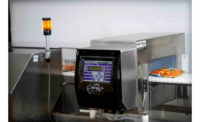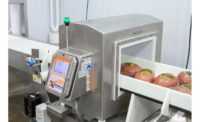What to look for when buying a food metal detector

Metal detection systems continue to be the mainstay of preventing contaminants entering the food production chain. As more advanced equipment enters the market, Fortress Technology offers a quick checklist to help food manufacturers select an inspection system that best suits their product, application requirements and budget.
- Overall Equipment Effectiveness - Compare the capital costs of different units and their anticipated service life and operating costs. Consider productivity improvements and machine uptime too. Also, investigate the possibility of purchasing a lower specification system and upgrading it if and when you need a higher performance level. It’s why Fortress metal detectors are modular by design. Factories can start out with a Phantom metal detector and add Stealth technologies, including data capture, if they need to meet retailer requirements in the future.
- Future compatibility - Legacy systems have a reputation for being expensive to maintain. With a Fortress machine, this will never be the case. The Fortress ‘NEVER OBSOLETE’ manufacturer’s guarantee is a valuable backward-compatibility program that enables customers to upgrade any existing Fortress metal detector - even those built 20+ years ago! This spans the system’s design and build, plus the future proofing of spares, maintenance and service.
- Signal strength - Detector sensitivity is dependent on many factors: aperture size, operating frequency, product speed and environment. Reducing aperture size is widely regarded as a simple and effective way to increase metal detector sensitivity. That’s because sensitivity is measured at the geometric center of the aperture. Considering the ratio of the aperture to the size of the product is a very important element to choosing the right machine for your product.
- Waste reduction - A high number of false rejects slows down a food line, wastes good product, and ultimately reduces profit. Reworking quarantined product is also time consuming and impacts productivity. Product effect is the main reason why false rejections occur. It’s most common on lines handling ‘wet’ items. For items like meat, dairy and ready meals, and where variations in density pose a challenge to X-Ray, the Fortress Interceptor unit provides a reliable option for addressing product effect, increasing stainless steel metal detection by 100% and reducing false rejects. A multi lane system can also help food manufacturers to isolate rejects, with a four lane multi-aperture unit reducing reject waste by 75%.
- Adaptability to changing spaces - Contrary to popular belief, inspection equipment doesn’t need to be fixed into place. Unlike most pipeline metal detectors on the market, our Meat Pump Pipeline is not fixed to the floor or ceiling. The unit can be maneuvered to different upstream processing lines where it can be connected securely and simply to vacuum fillers. Its mobility also makes it quicker and easier to roll out and dismantle for deep cleans. If space is at a premium, rather than installing individual metal detectors and conveyors side by side, consider a multi-aperture, multi-lane unit. A two lane configuration cuts the footprint by over 50%, and with just one system to maintain, can reduce total cost of ownership by over 65% longer term.
- Automatic performance verification - This can be especially useful when system access and positioning or environmental conditions impedes testing. Our Halo testing technology automatically mimics (and usually improves on) manual testing, increasing test frequency. This swiftly alerts machine operators to a potential test issue, significantly narrowing the time window during which a problem may go undetected. This in turn reduces the number of suspect products that must be discarded or recalled in case of an incident.
- Equipment care - The lifespan on any industrial machinery will depend on build and component quality, overall design, plus how hard it is worked and how well it is looked after. Having a maintenance schedule and ensuring operatives follow basic hygiene practices and are trained in equipment cleaning protocols will help to reduce wear and tear, plus help prevent cross contamination and allergen incidents. Look for the ingress protection (IP) rating on equipment. Also, inquire with the equipment manufacturer about features such as access ports, slide out access and ease of dismantling/re-assembly for deep cleans.
- Integration with other equipment - Given the number of lines in food production environments, metal detectors are frequently integrated with existing machinery, especially baggers and checkweighers. It is possible to have a single screen set up, linking all of the machinery together, resulting in a smaller footprint and a simpler way to gather and consolidate data. Sometimes, Fortress installs multiple reject positions on equipment: one for metals, another for a checkweigher, a third for a vision system.
- Traceability and record keeping - The benefit of having common reporting standards cannot be underestimated. Food factories today capture large volumes of data from lines. Technology can ensure this data is readable, meaningful and meets application and due diligence requirements. Contact Reporter Software used by Fortress customers on Stealth and Interceptor machines is an automated record keeper that documents all events, including but not limited to rejects, performance verification tests, settings/parameter changes, etc.
- Foil challenges - Generally speaking, metal detectors can phase out and run products packaged in metalized poly film packaging with a good level of sensitivity. However, pure aluminum foil, for example an oven ready tray, may prove too challenging. In this instance a ferrous in foil detector or an alternative inspection technology such as x-ray may be recommended.
For more information visit www.fortresstechnology.com.
Looking for a reprint of this article?
From high-res PDFs to custom plaques, order your copy today!









